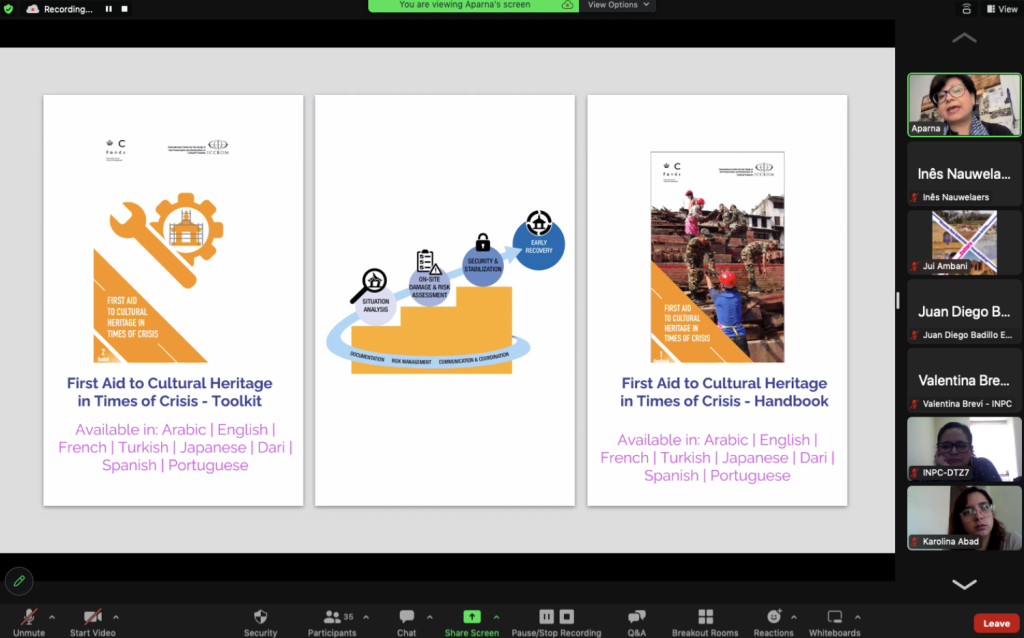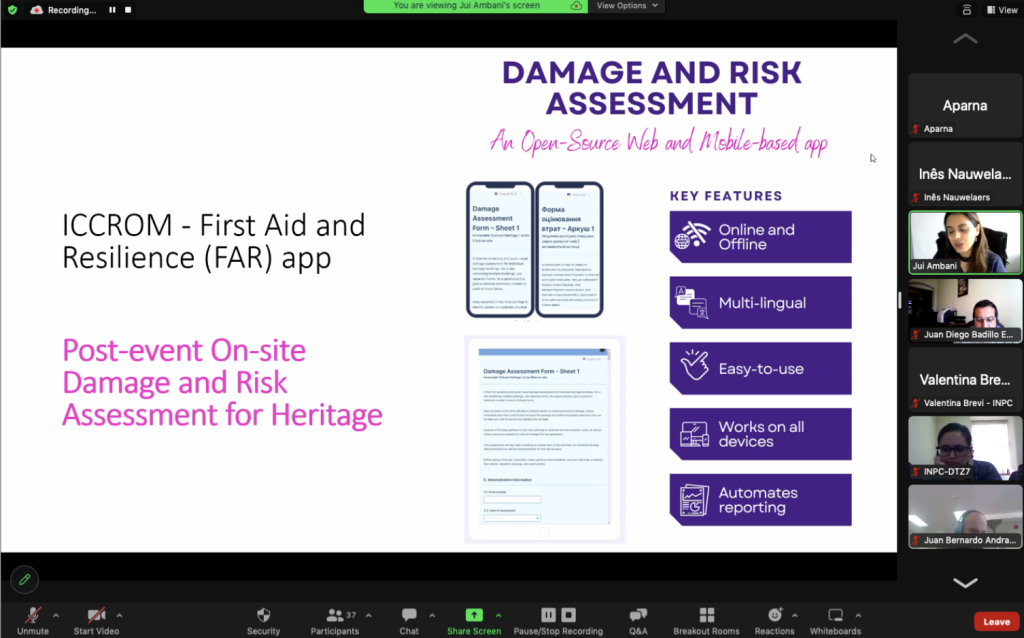On 10 May 2023, the ICCROM FAR team conducted a damage and risk assessment workshop for the Instituto Nacional de Patrimonio Cultural from Ecuador. We received a formal request from ICCROM Council Member Mr Juan Badillo and Ms Valentina Brevi, Director of de Gestión de Riesgos del Patrimonio Cultural, to hold the workshop in light of a recent earthquake that destroyed the city of Cuenca, Ecuador – a country with a high seismic risk. Disasters such as this one underscore the critical need for emergency preparedness to build resilience.
 FAR Senior Programme Leader Ms Aparna Tandon and Programme Assistant Ms Jui Ambani led the workshop by introducing the participants to the first aid to cultural heritage methodology, as well as providing a step-by-step overview on how to conduct damage and risk assessment for movable, immovable and intangible heritage. A case study from Ukraine was used to identify the different kinds of damages observed and possible sources of future damages, secondary risks and immediate first aid recommendations that could be made. The participants were then introduced to the ICCROM-FAR First Aid and Resilience app, a useful tool for a post-event on-site damage and risk assessment for heritage that can facilitate rapid operations, define priorities, identify major damages, as well as help plan and cost operations by ensuring efficient use of resources and use existing capacities, thanks to its risk-informed data collection forms.
FAR Senior Programme Leader Ms Aparna Tandon and Programme Assistant Ms Jui Ambani led the workshop by introducing the participants to the first aid to cultural heritage methodology, as well as providing a step-by-step overview on how to conduct damage and risk assessment for movable, immovable and intangible heritage. A case study from Ukraine was used to identify the different kinds of damages observed and possible sources of future damages, secondary risks and immediate first aid recommendations that could be made. The participants were then introduced to the ICCROM-FAR First Aid and Resilience app, a useful tool for a post-event on-site damage and risk assessment for heritage that can facilitate rapid operations, define priorities, identify major damages, as well as help plan and cost operations by ensuring efficient use of resources and use existing capacities, thanks to its risk-informed data collection forms.
 The workshop was attended by 33 participants representing multidisciplinary backgrounds, including archaeology, architecture and engineering, urban geography, curation, cultural heritage risk management, museology, anthropology, art history, sociology and cataloguing.
The workshop was attended by 33 participants representing multidisciplinary backgrounds, including archaeology, architecture and engineering, urban geography, curation, cultural heritage risk management, museology, anthropology, art history, sociology and cataloguing.
Now, the participants will form a core team and help tailor and customize the forms for movable and immovable heritage based on their local context. A second workshop will then be held with the team, who will use the app and conduct assessments on-site. Finally, participants will identify sites and regions where these expeditions will take place and develop a timeline for field-testing the app through expeditions to at least five damaged heritage sites and objects.
ICCROM’s FAR flagship programme specializes in a methodology that focuses on rapidly implementing post-event damage and risk assessments, whether conducted remotely or on-site. Our team is also experienced in helping governments define priorities in the aftermath of large-scale emergencies and disasters. This efficient emergency response can help safeguard cultural heritage in disaster-prone countries. It is therefore upon specific request of the affected Member State or ICCROM partner institution, as well as in cases involving substantive damage to cultural heritage far exceeding the capacity of the affected Member State, that FAR can provide help. This includes:
- Context-specific rapid needs assessments and post-event damage and risk assessments for safeguarding cultural heritage;
- On-site or online training for emergency responders, civil defence personnel, heritage professionals, experts and volunteers to provide first aid to tangible and intangible heritage;
- Capacity building for planning and implementing post-disaster and post-conflict recovery and peacebuilding operations;
- Setting up interagency coordination mechanisms; and
- Sharing and translating relevant resources.
